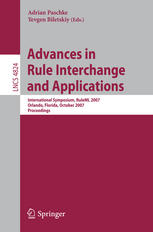

Most ebook files are in PDF format, so you can easily read them using various software such as Foxit Reader or directly on the Google Chrome browser.
Some ebook files are released by publishers in other formats such as .awz, .mobi, .epub, .fb2, etc. You may need to install specific software to read these formats on mobile/PC, such as Calibre.
Please read the tutorial at this link: https://ebookbell.com/faq
We offer FREE conversion to the popular formats you request; however, this may take some time. Therefore, right after payment, please email us, and we will try to provide the service as quickly as possible.
For some exceptional file formats or broken links (if any), please refrain from opening any disputes. Instead, email us first, and we will try to assist within a maximum of 6 hours.
EbookBell Team

5.0
38 reviewsThe International Symposium on Rule Interchange and Applications (RuleML-2007), collocated in Orlando, Florida, with the Tenth International Business Rules Forum, was the first symposium devoted to work on practical distributed rule technologies and rule-based applications which need language standards for rules operating in the context of modern infrastructures, including the Semantic Web, intelligent multi-agent systems, event-driven architectures, and service-oriented computing applications. The symposium was organized by the RuleML Initiative, financially and technically supported by industrial companies (Top Logic, VIStology, and Inferware) and in cooperation with professional societies (ECCAI, AAAI, ACM, ACM SIGAPP, ACM SIGMIS, ACM SIGART, ACM SIGMOD, IEEE, IEEE Computer TCAAS, IEEE SMCS, BPM-Forum, W3C, OMG, and OASIS). The RuleML Initiative is organized by representatives from academia, industry and government for the advancement of rule technology, providing enhanced usability, scalability and performance. The goal of RuleML (www. ruleml. org) is to develop an open, general, XML-based family of rule languages as intermediaries between various ‘specialized’ rule vendors, applications, industrial and academic research groups, as well as standardization efforts such as OMG’s PRR or W3C’s RIF. A general advantage of using declarative rules is that they can be easily represented in a machine-readable and platform-independent manner, often governed by an XML schema. This fits well into today’s distributed, heterogeneous Web-based system environments. Rules represented in standardized Web formats can be discovered, interchanged and invoked at runtime within and across Web systems, and can be interpreted and executed on any platform.